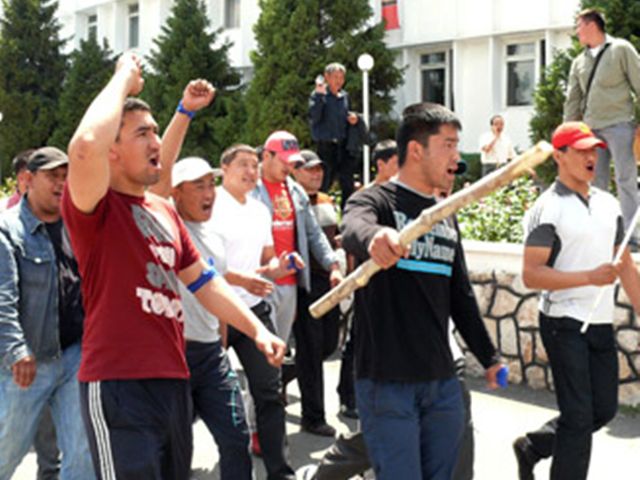
Tension Rises Ahead of Elections in Kyrgyzstan
Publication: Eurasia Daily Monitor Volume: 7 Issue: 147
By:

Kyrgyzstan’s parliamentary election on October 10, will either mark the beginning of a period of chaos or successful democratic change, according to Kyrgyz political leaders. The incumbent government leadership is convinced it will prove to be a turning point in democracy-building, while the opposition warns that more violence is inevitable prior to and after the elections. For the first time in Central Asia results of a parliamentary election are difficult to predict and there is no central authority to facilitate falsifying the vote. However, this uncertainty also fuels political tension within the country and makes the eruption of further violence almost unavoidable.
The political struggle will be particularly intense between Ata-Meken, led by Omurbek Tekebayev, and the Social Democratic Party (SDP), headed by Almazbek Atambayev. Both parties earned enough support to form a majority in the December 2008 parliamentary elections. Ata-Meken leaders argue that their party was supported by the majority of voters, but unlike the SDP, their party was denied any seats in parliament. Votes were falsified and, according to Ata-Meken, the SDP agreed to be a moderate opposition force in return for parliamentary seats. Owing to their representation in parliament during 2008-2010, the SDP’s leaders, among them Otunbayeva, (who recently left the party) gained more public exposure.
Tekebayev was one of the authors of the current constitution, including the ruling that no political party would be able to gain more than 60 percent of the votes during an election. Atamayev, in turn, demonstrated his political ambition by running for president in last year’s election. Both leaders were part of the provisional government and have resigned in order to prepare for the electoral campaign. Although they accept each other’s popularity, both struggle to prevail in parliament.
The most vehement opponents of Kyrgyz President, Roza Otunbayeva warn that the political struggle is likely to turn ugly. The opposition, mostly composed of deposed President, Kurmanbek Bakiyev’s, allies, is mobilizing its resources for the elections. Among the most vocal are the former Vice Prime Minister, Omurbek Babanov, former Security Council Chairman, Adakhan Modumarov, and the leader of the Communist Party, Iskhak Masaliev (www.akipress.kg, July 28). Unlike the presidential election in the aftermath of the March 2005 regime change, opposition voices are readily accepted by the wider public, which remains more cautious about trusting a new leadership.
Earlier this month, the Organization for Security and Cooperation in Europe (OSCE) promised to send a 52-member Police Advisory Group to southern Kyrgyzstan to train local police forces and help monitor the situation. An additional fifty OSCE policemen are likely to be dispatched at a later date. If there is a fresh outbreak of violence, however, the OSCE police contingent will have only a limited impact on the situation on the ground.
The OSCE presence is considered by some in Kyrgyzstan as an infringement on the country’s sovereignty (www.24.kg, July 26). Several sporadic protests against the police deployment have occurred in Bishkek and Osh. Leaders such as Felix Kulov, a former KGB general and head of the Ar-Namys party, argue that the OSCE must arm its policemen for their own security.
Overall, there is little enthusiasm about the OSCE presence, which is viewed negatively by the local police forces. Led by influential Kubatbek Baibolov, the Kyrgyz police force will be mobilized more quickly in comparison with the events in southern Kyrgyzstan in early June. Under his leadership, the police are also likely to act faster to preserve stability, both before and after parliamentary elections. At this point, an external influence upon the security situation appears to be a source of irritation for the Kyrgyz police force.
Baibolov, a former opposition Member of Parliament (MP), was forced to flee Kyrgyzstan and find refuge in the US. He returned to Bishkek after the April 7, 2010 regime change, and wants to play an active role in the country’s political life. Amidst the introduction of positive change, Baibolov is one of the security leaders ambivalent about the idea of an international investigation into the causes of the violence in Osh and Jalalabad. Instead, he prefers an investigation conducted solely by local law-enforcement forces, and denies reports of police involvement in illegal arrests and torturing members of the Uzbek population (www.mvd.kg, July 20).
Meanwhile, Kyrgyzstan has received $1.1 billion in international aid. Otunbayeva has affirmed that her government will closely follow the international community’s recommendations, showing her openness to foreign donors (www.akipress.kg, July 27). Approximately $350 million will be allocated for the reconstruction of southern Kyrgyzstan and $100 million is earmarked for investment in the economy (www.24.kg, July 27). Surrounded by a zealous political opposition, international support seems the only major source of empowerment for Otunbayeva’s government.




